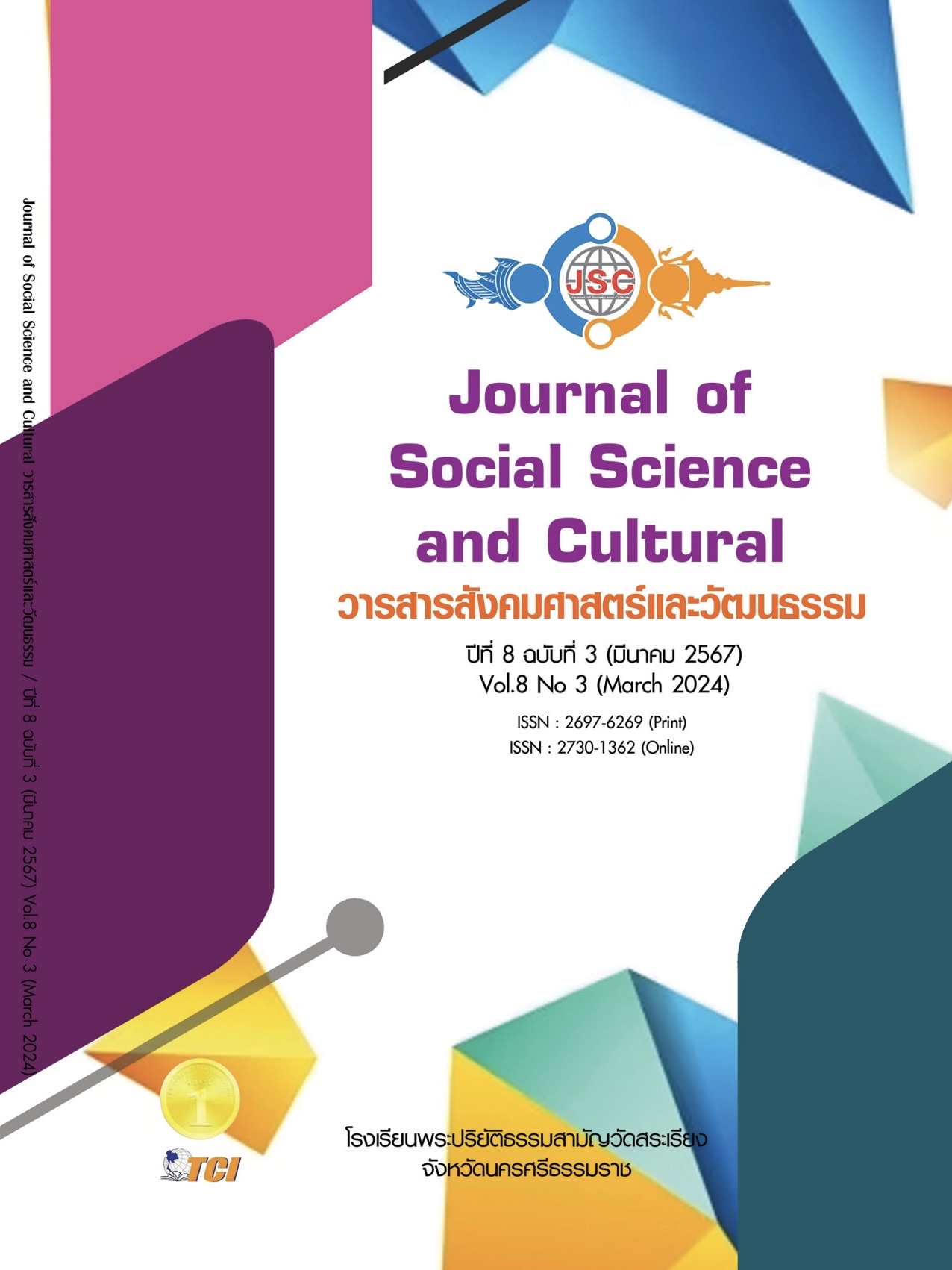QUALITY PROMOTION OF LIFE IN EDUCATION ACCORDING TO BUDDHIST PRINCIPLES OF STUDENTS MAHAMAKUT BUDDHIST UNIVERSITY ROI ET CAMPUS
Main Article Content
Abstract
The objectives of this research paper are 1) to study the promotion of educational quality of life according to Buddhist principles of students, of Mahamakut Buddhist University, Roi Et Campus 2) To make recommendations regarding the application of Buddhist principles to promote the quality of educational life of students Mahamakut Buddhist University, Roi Et Campus It is qualitative research. By studying the primary documents, namely the Tripitaka and the Commentary. Interviews with 23 key informants obtained from the selection of questionnaires and experts in religion and philosophy on the application of the 4 Iddipada principles through in-depth interviews and focus group discussions. Data were analyzed using purposive sampling. Content analysis and presented in a descriptive format. The results of the research found that 1) Mahamakut Buddhist University student Roi Et Campus Promote the quality of life in education according to Buddhist principles by applying the 4 principles of influence in having regulations in accordance with the regulations of Mahamakut Buddhist University. Roi Et Campus, Gharavasa-dhamma 4, brought to promote the quality of life in terms of householding. and perform other duties as assigned by the university. 2) Suggestions regarding the application of Buddhist principles to promote the quality of educational life of students at Mahamakut Buddhist University. Roi Et Campus Improves the quality of life of students Focuses on applying Buddhist principles to promote the quality of life of students in 3 areas: student skills Morality and ethics of students and the happiness aspect of students in these 3 areas has different forms and methods of development. To provide students with excellent process knowledge and skills to deal with what they have encountered. Have morality and ethics in living life and be happy with living life as well as studying.
Article Details
References
กระทรวงศึกษาธิการ. (2560). สำนักงานเลขาธิการสภาการศึกษา แผนการศึกษาแห่งชาติ พ.ศ. 2560-2579. (พิมพ์ครั้งที่ 1). กรุงเทพมหานคร: บริษัท พริกหวานกราฟฟิค จำกัด.
นัฐศรัณย์ ชุมวรฐายี. (2560). ศึกษาหลักฆราวาสธรรม 4 ในการดำเนินชีวิตของผู้ปฏิบัติวิปัสสนาภาวนา วัดปัญญานันทาราม จังหวัดปทุมธานี. ใน สารนิพนธ์พุทธศาสตรมหาบัณฑิต สาขาวิชาวิปัสสนาภาวนา. บัณฑิตวิทยาลัย มหาวิทยาลัยมหาจุฬาลงกรณราชวิทยาลัย.
พระพรหมคุณาภรณ์ (ป.อ. ปยุตฺโต). (2554). พจนานุกรมพุทธศาสน์ ฉบับประมวลศัพท์. (พิมพ์ครั้งที่ 16). กรุงเทพมหานคร: โรงพิมพ์มหาจุฬาลงกรณราชวิทยาลัย.
พระมหาบุญมี มาลาวชิโร. (2553). พุทธบริหาร. กรุงเทพมหานคร: บริษัท ธิงค์ บียอนด์บุ๊คส์ จำกัด.
พระรณชัย กิตฺติราโณ (ส่งศณี). (2561). การประยุกต์หลักใช้อริยมรรคมีองค์ 8 ในการดำเนินชีวิตของประชาชนในตำบลในเมือง อำเภอเมือง จังหวัดหนองคาย. ใน วิทยานิพนธ์พุทธศาสตรมหาบัณฑิต สาขาวิชาพระพุทธศาสนา. บัณฑิตวิทยาลัย มหาวิทยาลัยมหาจุฬาลงกรณราชวิทยาลัย.
พวงทอง ไกรพิบูลย์. (2560). กรอบแนวคิดคุณภาพชีวิต. เรียกใช้เมื่อ 6 สิงหาคม 2562 จาก www2.tsu.ac.th
วชิรพงษ์ พลตื้อ. (2549). การนำหลักธรรมมาใช้ในการปฏิบัติหน้าที่ของพนักงานส่วนท้องถิ่น: ศึกษาเฉพาะกรณีอำเภอสุวรรณภูมิ จังหวัดร้อยเอ็ด. ใน สารนิพนธ์ศาสนศาสตรมหาบัณฑิต สาขาวิชาการปกครอง. บัณฑิตวิทยาลัย มหาวิทยาลัยมหามกุฏราชวิทยาลัย.
วิภาพร มาพบสุข. (2542). จิตวิทยาทั่วไป. กรุงเทพมหานคร: ศูนย์ส่งเสริมวิชาการ.
สำนักงานคณะกรรมการการศึกษาแห่งชาติ. (2545). การควบคุมคุณภาพการศึกษาการประเมินประกันคุณภาพ. (พิมพ์ครั้งที่ 4). กรุงเทพมหานคร: สำนักงานรับรองมาตรฐานและประเมินคุณภาพการศึกษา.
สุพรรณิการ์ มาศยคง. (2554). การศึกษาพัฒนาคนพัฒนาเศรษฐกิจสังคมและประเทศชาติ. ใน วิทยานิพนธ์วิทยาศาสตรมหาบัณฑิต สาขาสถิติประยุกต์และเทคโนโลยีสารสนเทศ. สถาบันบัณฑิตพัฒนบริหารศาสตร์.


